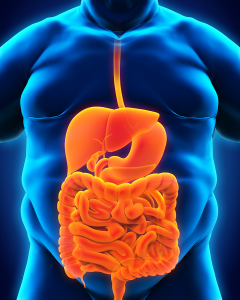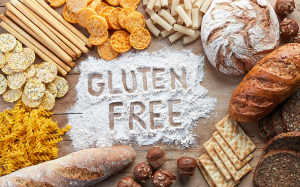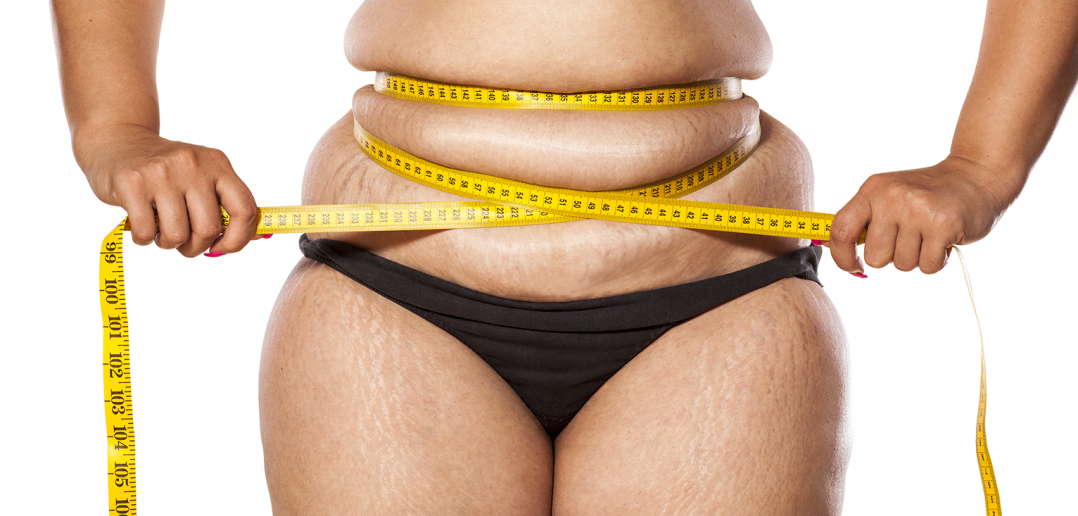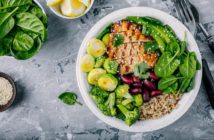In the past we have been led to believe that losing weight is all about what you eat and how much exercise you do. But actually this is only one element of weight control, and one that fails and frustrates many dieters.
Of course there may be medical conditions that pertain to weight gain, such as an underactive thyroid, and lifestyle factors such as stress and sleep play a part, but we are now beginning to understand that our digestive systems are key when it comes to our ability to lose weight.
Many people live with digestive complaints of varying degrees, such as bloating, cramping, constipation, diarrhoea, gas, and indigestion. Such problems are so commonplace we think of them as normal, but really they’re not. These symptoms are an outward sign of dysfunction within and represent issues such as inflammation, difficulties breaking down food, food intolerance, a damaged gut lining, plus an overgrowth of unhealthy bacteria and other microbes.
We are now beginning to understand that our digestive systems are key when it comes to our ability to lose weight
Intestinal health can be thought of as a complex system that relates to the intake, breakdown and absorption of foods, and then the effective excretion of waste products.
Any number of things can go wrong at each stage and set the scene for health problems throughout the body, including depression, autoimmune conditions, allergies, skin problems and fatigue.
But how does this all apply to weight loss? Actually conditions within the gut are incredibly relevant to weight loss in a number of key ways.

Intestinal health can be thought of as a complex system that relates to the intake, breakdown and absorption of foods, and then the effective excretion of waste products
Bacteria. Inside your digestive system are approximately 100,000,000,000, microbes – that’s one hundred trillion! You could say we’re more bacteria than we are human in fact, because bacteria outnumber our own cells ten to one.
The balance and species of the microbes living in your gut can impact on how you break down and store food, as well as your metabolism and how hard or easy it may be to lose weight.
One factor that plays a part in this is something called Toll-Like Receptor 5, or TLR5 for short. This protein helps to keep the bacteria behaving properly, and to stop any bad bacteria from growing out of control. A deficiency in this TLR5 can lead to obesity and diabetes because the bad bacteria can promote overeating and inflammation when allowed to multiply.
It has been found that the bacterial diversity and species differ between the digestive systems of those that are obese compared with those at a normal weight. We know that different species of bacteria have varying effects on appetite and metabolism, and so an overgrowth of some species can promote overeating and difficulty losing weight. An unhealthy change in gut flora towards larger populations of the pathogenic strains can also alter how we store the carbohydrates that we take in, signaling more calories to be stored as fat.
Leaky gut. Bacterial imbalance can often result in something called ‘leaky gut’. Leaky gut means that the lining of the intestines becomes too permeable, and this allows foreign particles, such as toxins and undigested food to get into the bloodstream. Toxins and undigested food inappropriately reaching the bloodstream cause the immune system to be activated, which promotes inflammation. Inflammation contributes to blood sugar imbalance, by worsening insulin resistance, a condition where your cells don’t respond well to the insulin that has been produced, so your blood sugar stays higher than it should.
High blood sugar and high insulin levels promote weight gain, especially around the middle. What’s worth noting here is that the more fat that is stored, and the more those fat cells swell, the more inflammation is triggered, so it’s a viscous cycle that is hard to break without addressing the underlying problems within the digestive system.

Cereal grains, especially gluten (wheat, rye, barley) – they have been strongly linked to leaky gut
Leaky gut can also promote weight gain through food sensitivities. Those large, undigested protein particles that enter the blood stream can provoke an immune reaction and set the scene for multiple food sensitivities.
One common symptom of food sensitivity is weight gain through water retention, which can lead to excess weight and puffiness throughout the body. You may also be suffering from brain fog, fatigue, joint pain, eczema, sinus congestion and irritability if you are reacting adversely to foods in your diet.
The more fat that is stored around the belly, the more those fat cells swell, the more inflammation is triggered, so it’s a viscous cycle that is hard to break
So we can see that balancing the bacteria within our large intestines, healing the gut lining, and identifying and avoiding foods that we may have become sensitised to could help promote weight loss and help sustain a healthy weight.
Here are my tips for restoring digestive health and maximising weight loss
| Avoid or minimise factors that upset bacterial balance and cause a leaky gut |
|---|
| Stress – stress impacts on all elements of digestion and may even influence the composition of the gut flora. |
| Lack of sleep – research suggests that less than eight hours per night can increase inflammation and promote weight gain. |
| Sugar and fructose – they stress the liver and feed unhealthy bacteria and yeasts, which can upset the delicate bacterial balance in the gut and promote damage to the lining. |
| Cereal grains, especially gluten (wheat, rye, barley) – they have been strongly linked to leaky gut. See note about food sensitivities below. |
| Alcohol – it is very irritating to the gut lining. |
| Antibiotics – they don’t discriminate and so kill our healthy intestinal bacteria too, which upsets the balance and promotes leaky gut. |
| NSAID (Non Steroidal Anti-Inflammatory Drugs) like ibuprofen – they can directly damage the gut lining. |
| Food allergies or sensitivities – identify through an elimination diet by cutting out gluten, dairy, yeast, corn, soy, and eggs for two weeks and monitor symptoms. Consult a nutritional therapist for guidance if needs be. |
| Infections – if your symptoms persist despite making changes, you may be suffering from an underlying infection such as from a parasite or a yeast overgrowth. |
| Incorporate factors that restore the balance of bacteria, reduce inflammation and heal the gut lining |
|---|
| Healthy fibre – from vegetables, low sugar fruits, nuts and seeds, beans and pulses. They encourage efficient elimination of waste through the bowel. |
| Probiotics – from fermented foods like sauerkraut, kefir and kimchi. You can also take a quality probiotic supplement to help improve bacterial balance. |
| Prebiotics – from onions, garlic, Jerusalem artichokes, sweet potatoes, bananas and asparagus – they may selectively feed the beneficial bacteria. |
| Digestive enzymes – they can help break food down more effectively so you can benefit from the raw material within your food, and minimise undigested food getting into your bloodstream or feeding unhealthy bacteria. |
| Bone broth – contains gelatin that helps to heal the lining of the gut. |
| Antioxidant-rich foods – to reduce inflammation, such as colourful fruits and vegetables including berries, leafy greens, peppers, beetroot, squash. |
| Essential fats – from oily fish, flax and chia seeds, avocados, extra virgin olive oil, macadamias, and walnuts. They all help to reduce inflammation. |
| Spices – include ginger, turmeric, cinnamon and cayenne in your diet, all have anti-inflammatory properties. |
| Eat properly – eating on the run, standing up, when stressed or barely chewing your food, can lead to digestive problems because the body just isn’t in the right ‘mode’ to process food. It may sounds simple, but don’t be deceived – taking time to relax before and during meal times, focusing on your food, and chewing properly can make the world of difference to your ability to break down food and absorb it, reducing potential damage and disorder further down the digestive tract. |




